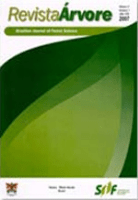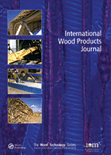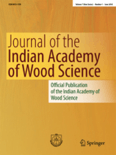
MOKUZAI GAKKAISHI
Scope & Guideline
Pioneering Research in Wood Materials and Processing
Introduction
Aims and Scopes
- Wood Properties and Performance:
Research in this area examines the mechanical, physical, and chemical properties of various wood species, including their behavior under different conditions. This includes studies on strength, elasticity, and durability, which are critical for both construction and product development. - Wood Processing Technologies:
This scope covers advancements in technologies related to wood processing, including methods for improving wood treatment, preservation, and bonding techniques. Innovations in adhesive formulations and processing methods are significant for enhancing wood product performance. - Environmental Impact and Sustainability:
The journal addresses the ecological implications of wood utilization, including life cycle assessments (LCA) and the sustainability of wood as a renewable resource. Studies often focus on the carbon footprint of wood products and their role in climate change mitigation. - Biological Interactions and Wood Decay:
Research related to the biological aspects of wood, including studies on wood decay, the effects of fungi and insects, and the development of bio-based preservatives, is a crucial part of the journal's scope. This area emphasizes understanding natural processes that can affect wood longevity. - Cultural and Historical Aspects of Wood Utilization:
The journal also explores the cultural significance of wood, including studies on historical wood usage and conservation of wooden artifacts. This area highlights the intersection of wood science with cultural heritage.
Trending and Emerging
- Sustainability and Carbon Management:
There is an increasing focus on the sustainability of wood products and their role in carbon management. Research is expanding into how wood can be utilized to mitigate climate change, including studies on carbon stocks in harvested wood products. - Advanced Wood Processing Technologies:
Emerging studies highlight significant advancements in wood processing technologies, including new methods for enhancing the performance of engineered wood products like cross-laminated timber (CLT) and innovations in adhesive technologies. - Health and Psychological Effects of Wood Materials:
Recent publications have begun exploring the physiological and psychological impacts of wood in built environments. This includes studies on how different wood types affect human comfort and well-being, indicating a growing intersection between wood science and human factors. - Utilization of Biomass and Waste Materials:
Research on the utilization of wood biomass and waste products is gaining traction. This includes studies on the conversion of wood waste into valuable materials and energy, reflecting a broader interest in resource efficiency. - Innovations in Wood Preservation and Durability:
There is a notable trend towards developing new preservation methods to enhance the durability of wood products. This includes research on fire retardancy and resistance to biological decay, indicating a proactive approach to prolonging the life of wood materials.
Declining or Waning
- Traditional Wood Utilization Techniques:
Research that focuses on ancient or traditional methods of utilizing wood has decreased, possibly due to the shift towards modern techniques and materials that prioritize efficiency and sustainability over historical practices. - Basic Biological Studies of Lesser-known Species:
There has been a noticeable decline in studies focusing on lesser-known or underutilized wood species. As the emphasis shifts towards more commercially viable and widely used species, research on these lesser-known varieties has diminished. - Wood Artifacts and Cultural Studies:
While cultural aspects of wood are still relevant, the specific focus on the conservation and study of wooden artifacts and their historical contexts seems to be less frequently represented in recent publications.
Similar Journals

Floresta e Ambiente
Empowering knowledge for a sustainable future in forestry.Floresta e Ambiente is a pioneering open-access journal dedicated to advancing knowledge in forestry and environmental science, published by the Federal Rural University of Rio de Janeiro's Institute of Forests. Since its inception in 2012, this journal has emerged as a crucial platform for researchers, professionals, and students to disseminate innovative findings and foster discussions on sustainable forest management, conservation practices, and the ecological significance of forests in Brazil and beyond. With an impressive impact factor and a commendable ranking in the SCOPUS database, positioned in the 49th percentile of the Agricultural and Biological Sciences category, Floresta e Ambiente actively supports the dissemination of high-quality research while contributing to the global discourse on forestry. As an open access journal since 2013, it ensures that valuable knowledge is readily available to all, enhancing collaboration and engagement within the scientific community.

REVISTA ARVORE
Connecting Scholars to Advance Forestry ScienceREVISTA ARVORE is a distinguished, peer-reviewed journal in the field of Forestry, published by Universidade Federal de Viçosa in Brazil. Renowned for its commitment to open access since 2002, this journal facilitates the dissemination of innovative research and knowledge to a global audience, encompassing topics from sustainable forest management to ecological conservation. With an impact factor reflective of its engagement in the community and a current Scopus ranking that places it in the 28th percentile among journals in Agricultural and Biological Sciences, it provides a vital platform for both emerging and established scholars. The journal is indexed under ISSN 0100-6762 and E-ISSN 1806-9088, making it accessible to a wide readership. As it converges its publication years from 2006 to 2024, REVISTA ARVORE aims to contribute significantly to the advancement of forestry science and practices, thereby encouraging environmental sustainability and innovation within the field.

Wood Material Science & Engineering
Fostering Interdisciplinary Research in Wood EngineeringWood Material Science & Engineering, published by Taylor & Francis Ltd, is a pivotal journal in the field of materials science, focusing specifically on the intricate properties, performance, and applications of wood-based materials. With an ISSN of 1748-0272 and an E-ISSN of 1748-0280, this journal has established itself as a valuable resource for researchers and professionals working in the interdisciplinary domains of material science and engineering related to wood. Since its inception in 2006, the journal has seen continual growth, with its 2023 Scopus Rank placing it in the 49th percentile among general materials science journals. Although listed in Q3 of the materials science category, it plays a crucial role in facilitating innovative research and applications of wood materials, thereby significantly influencing sustainable practices in engineering and design. The journal invites original research articles, reviews, and case studies to further the understanding of wood materials, making it an ideal platform for scholars and practitioners dedicated to advancing material science. For researchers looking to disseminate their findings to a global audience, Wood Material Science & Engineering promises a dedicated avenue for impactful communication.

WOOD SCIENCE AND TECHNOLOGY
Transforming Wood Science for a Sustainable FutureWOOD SCIENCE AND TECHNOLOGY, published by SPRINGER, is a premier academic journal dedicated to the multidisciplinary study of wood and its applications. With a rich history spanning since its inception in 1967 and continuing through 2024, this journal plays a vital role in advancing our understanding of forestry, industrial and manufacturing engineering, and materials science. It enjoys an impressive categorization in the 2023 rankings, securing a Q1 status in Forestry and notable Q2 rankings in Industrial and Manufacturing Engineering, Materials Science, and Plant Science. Researchers and professionals benefit from its rigorous peer-reviewed articles, making substantial contributions to the field. The journal is actively indexed, ensuring high visibility and access to its content, which is essential for anyone looking to stay at the forefront of wood science research. The current impact factors and rankings affirm its significance, making it a critical resource for academics seeking to foster innovation and collaboration in wood technology and related disciplines.

Lesnoy Zhurnal-Forestry Journal
Transforming Insights into Action for a Sustainable EnvironmentLesnoy Zhurnal-Forestry Journal is a prominent academic publication dedicated to advancing the field of forestry and environmental sciences. Published by the Northern Arctic Federal University M. V. Lomonosov, this journal focuses on innovative research, practices, and policies related to forestry management and conservation. With an Open Access model established since 2015, the journal ensures widespread dissemination of knowledge and foster collaborative research across global scholarly communities. Located in Arkhangelsk, Russia, the Lesnoy Zhurnal appeals to researchers, professionals, and students alike, providing a platform for sharing valuable insights and addressing emerging challenges in forestry. Though specific metrics like HIndex and Scopus rankings are presently unlisted, the journal is committed to excellence and aims to enhance its visibility and impact within the scientific community. This publication is not only a critical resource for ongoing research but a key player in shaping sustainable forestry practices in a rapidly changing environment, making it indispensable for anyone involved in forestry and environmental studies.

Acta Silvae et Ligni
Advancing Sustainable Forestry and Wood ScienceActa Silvae et Ligni is a prominent open access journal dedicated to the field of forestry and wood science, published by the esteemed GOZDARSKI INST SLOVENIJE. Since its inception in 2013, the journal has been committed to disseminating high-quality research that provides valuable insights into sustainable forest management, wood properties, and environmental interactions. With its ISSN 2335-3112 and E-ISSN 2335-3953, it serves as a vital resource for researchers, professionals, and students alike, fostering academic collaboration and innovation. The journal’s commitment to open access ensures that research is freely available to a global audience, promoting knowledge sharing and driving advancements in the field. While awaiting formal Scopus rankings, Acta Silvae et Ligni is actively working to enhance its impact and reach, making it a crucial platform for those engaged in the study and management of forest resources.

CANADIAN JOURNAL OF FOREST RESEARCH
Transforming challenges into opportunities in forest research.Canadian Journal of Forest Research (ISSN: 0045-5067, E-ISSN: 1208-6037), published by Canadian Science Publishing, stands as a leading platform for disseminating cutting-edge research in the field of forestry and ecological sciences. With an impressive impact factor and a steady reputation for high-quality publications, this journal occupies a prestigious position indicated by its Q1 ranking in Forestry and Q2 in Ecology as of 2023, alongside commendable placements in global and planetary change studies. Covering a broad scope from sustainable forest management to the impacts of climate change on forest ecosystems, the journal encourages submissions that address contemporary challenges and innovations in forest research. Operating from its base in Ottawa, Canada, the Canadian Journal of Forest Research has been a cornerstone of academic discourse since 1974, offering researchers and professionals vital access to pioneering studies that inform policy and practice in forestry. Researchers, educators, and students alike will find this journal an indispensable resource for advancing knowledge and fostering collaboration in the vital realm of forest research.

International Wood Products Journal
Connecting Researchers to the World of Wood ProductsInternational Wood Products Journal is a premier academic publication dedicated to advancing knowledge in the fields of forestry and materials science. Published by SAGE Publications Inc, this journal serves as a critical forum for researchers and professionals alike, focusing on innovative developments and sustainable practices related to wood and wood products. With an impressive impact factor that places it in the Q2 category for forestry and Q3 for materials science in 2023, it showcases high-quality research that influences policy and practice. Covering a wide scope from 2010 to 2024, the journal offers insightful articles and reviews that highlight the latest findings and technological advancements in wood products. Notably indexed in Scopus, it ranks 69th out of 174 in Forestry and 296th out of 463 in General Materials Science, attesting to its relevance and contribution to these fields. Researchers and students are encouraged to explore this journal for cutting-edge information and collaborative opportunities within the international wood products community.

Journal of the Indian Academy of Wood Science
Pioneering Research for a Sustainable FutureJournal of the Indian Academy of Wood Science, published by Springer India, is a vital resource for scholars and practitioners in the fields of Biomaterials, Forestry, and Plant Science. With an ISSN of 0972-172X and an E-ISSN of 0976-8432, this journal has evolved since its inception in 2010 and continues to contribute significantly to the academic discourse until 2024. Notably indexed in Scopus, it holds respectable quartile rankings, including Q3 in Forestry and Q4 in both Biomaterials and Plant Science for 2023, indicating its niche yet impactful presence in the academic community. The journal aims to disseminate cutting-edge research, innovative methodologies, and practical applications regarding wood science and related fields. Researchers, professionals, and students are encouraged to engage with a plethora of studies that enhance the understanding and utilization of wood as a sustainable resource, making this journal an essential addition to their libraries.

Kastamonu University Journal of Forestry Faculty
Enhancing scientific discourse in forestry and environmental stewardship.Kastamonu University Journal of Forestry Faculty, published by KASTAMONU UNIV, is a prestigious open-access journal dedicated to advancing knowledge in the field of forestry and environmental sciences. Established in 2001, this journal provides a vital platform for researchers, professionals, and students to share their findings and insights on topics such as sustainable forest management, ecological restoration, and forestry education. Its commitment to open access ensures that groundbreaking research is readily available to a global audience, fostering collaboration and innovation in the field. Although specific metrics such as HIndex are currently not available, the journal continues to strive towards increasing its visibility and impact within academic circles. With a strong focus on promoting scholarly exchange, the Kastamonu University Journal of Forestry Faculty plays a crucial role in enhancing the scientific discourse surrounding forestry issues at both local and international levels.